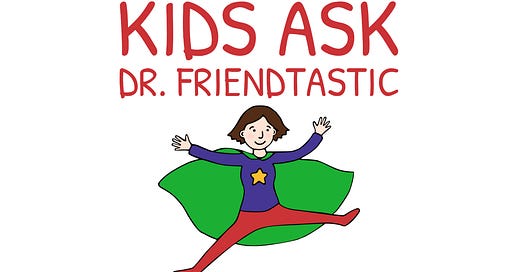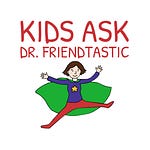Hi,
Children don’t need to learn how to hit; they need to learn how not to hit. This is harder for some kids than others.
Between ages 2 and 4 years, most kids at least sometimes resort to hitting, kicking, or pushing peers. During the school years, overall rates of physical aggression drop as kids become better at managing their emotions, communicating, and solving problems.
A study by Sylvana Côté and colleagues, followed kids between 2 and 11 years of age. They found that about half of the kids were sometimes physically aggressive as toddlers but rarely aggressive by age 11. They weren’t perfect, but they were moving in the right direction! About a third of the kids were little angels who showed very little aggression as young kids and almost none by late elementary school. The remaining one sixth of kids struggled with self-control. They were very aggressive as toddlers and continued to show high rates of aggression through elementary school.
In this week’s podcast, Aubrey, who is six years old, wants to know what to do when her friend hits her. Obviously, hitting a friend is not a good thing to do, but it’s also not uncommon at this age. It takes time and practice for kids to learn to manage their emotions, communicate clearly, and solve problems peacefully. It can also be hard to figure out when to be patient and try to work things out with a friend versus when to decide the other kid has crossed a line and the friendship is over.
Has your kid ever had an aggressive friend? Has your kid been the one who hits friends? I’d love to hear your thoughts or experiences.
Warm wishes,
Dr. Eileen
P.S. Check out this FREE quiz: Is Your Child a Good Friend?
P.P.S. Paid subscribers now get Podcast Parent Notes that go deeper into the weekly podcast topic as well as a coupon code for $20 off the monthly featured webinar. For September, that’s Dealing with Feelings About Friends – For Kids!
Scroll down for an easy-to-read podcast TRANSCRIPT, DISCUSSION QUESTIONS, and how to submit YOUR CHILD’S QUESTION.
You might also like these podcast episodes:
Ep. 59 – Jessie, Age 13: Get rid of toxic friends
Ep. 6 – Jayden, Age 9: Why do kids bully?
Ep. 62 – All About Forgiveness
Would YOUR kid enjoy being featured on the podcast?
Adults, please use your smartphone's memo function or an audio app to record your child's question. Hold the phone close to your child's mouth to make sure the recording is clear. Have your child state:
their FIRST NAME (or another first name),
their AGE, and
a BRIEF QUESTION or concern about friendship. (Please do not include any friends' names.)
Submit the audio file at https://DrFriendtastic.com/submit. I’ll answer as many questions as I can. (Obviously, this is not psychotherapy, and it’s not for emergency situations.)
Think About It Questions to discuss with your child
For a quick and easy FRIENDSHIP LESSON, play the podcast up to the end of the kid’s question, then ask your child/students what advice they’d give. Play my answer, then use the discussion questions below to deepen your child’s/students’ understanding.
School age kids know they shouldn’t hit people, so why do you think they sometimes do?
If someone hits you, why is hitting them back likely to make the situation worse? What could you do instead?
If a friend did something you didn’t like, how would you decide whether to try to talk about it and work things out or end the friendship?
Dr. Friendtastic said, “The best time to talk about a problem is when people are NOT extremely upset.” Why is that true? (Hint: What’s likely to happen if you try to talk to someon about a problem when you or they are extremely upset?)
Transcript
Hi there! I’m Dr. Eileen Kennedy-Moore, also known as Dr. Friendtastic. I’m an author and clinical psychologist based in Princeton, NJ.
Here’s today’s question:
Hi, My name is Aubrey, and I'm 6 years old, and what do I [do] if a friend hits me?
Oh my goodness, Aubrey! I’m sorry to hear that your friend hits you! That’s not kind. It’s confusing when someone we like and consider a friend does something we definitely don’t like, like hitting us! And you said “hits” rather than “hit” so it sounds like this has happened more than once. In addition to feeling confused, you might also be feeling hurt, scared, or angry.
You may have thought about hitting her back so she knows what it feels like! But I think you know that’s not a good idea. There is zero chance that if you hit her she’ll think, “Ah! Because you’ve hit me, I will now be kind to you!” She’d probably hit you back harder! So, hitting her is likely to make your situation worse. Also, if you hit her back, then you would be the kind of person who hits her friends. Yikes! We don’t want that!
Before I talk about how you might handle this situation, there’s an important question you need to think about: Does it make sense for you to continue being friends with this kid?
Only you can answer that question. Only you know how this friendship makes you feel overall and whether it’s worth trying to fix things. Friendships are precious, so we don’t want to dump them easily, but we also don’t want to stay in relationships that frequently make us feel bad.
Everyone makes mistakes. Every relationship hits rough spots because we’re not perfect, and neither are our friends. But the foundation of friendship is caring. And hitting someone is not a caring thing to do.
If the hitting is very painful and makes you feel scared about being around her, you need to tell a grown-up and probably stay away from her as much as you can. Every kid has a right to feel safe, including you!
If the hitting is not that bad, it may help to try to figure out why your friend hits you because that could give you ideas about how to respond or avoid it.
What does your friend’s face look like when she’s hitting you? What does her voice sound like? What does she say? What’s happening just before she hits you?
Maybe she’s trying to be funny. If she’s smiling, laughing, and acting silly, maybe she’s just fooling around and doesn’t realize you don’t like that game! I know it seems like she should know you don’t like to be hit, but maybe she doesn’t!
The best time to talk about a problem is when people are not extremely upset. When you next get together, you could tell your friend calmly and firmly, “I don’t like it when you hit me. Please don’t do that.” If she still hits you, you might have to tell her again, “Stop! That hurts! I don’t like it when you hit me.” If she still doesn’t listen, go play with someone else for a while. You don’t have to put up with being hit, even if she doesn’t think it’s a big deal.
Or, maybe she’s hitting you because she’s trying to get something. Maybe she wants a toy or a certain seat or to go first. In that case, you could try preventing problems by talking with your friend when you’re both calm and figuring out a way to share whatever it is that’s fair to both of you. Or, you may need to stand up for yourself by saying firmly, “Stop hitting me! I was here first!” If a grown-up is around, that might make them come running, or it might help her learn she can’t push you around.
But, maybe the hitting happens as part of a big argument that’s built up and built up between you. Maybe your friend thinks you’re not listening to her and that’s why she hits! That’s no excuse for hitting, but it might mean it’s worth coming up with a plan for how to handle tricky situations that get you both worked up. For instance, if it’s a certain game that tends to end badly between you, maybe you could figure out the rules of the game together before you play or choose a different game.
I don’t know how big of a problem you think the hitting is or whether your friend can change. If you’re concerned for your safety, I don’t think you should hang around with this kid. If it’s more of an annoyance, you might be able to work things out and make your friendship stronger.
This has been Kids Ask Dr. Friendtastic. If you have a question about making and keeping friends that you’d like me to answer, go to DrFriendtastic.com, and click on the podcast tab to see how to submit your question.
You can learn even more about friendship through my funny and practical books for kids: Growing Friendships: A Kids’ Guide to Making and Keeping Friends and Growing Feelings: A Kids’ Guide to Dealing with Emotions About Friends and Other Kids. They’re available through your library or wherever you buy books.
The Dr. Friendtastic for Parents newsletter and the Kids Ask Dr. Friendtastic podcast are for educational purposes only. They may or may not be relevant for your particular situation. I trust you to use your judgment about what’s right for your child and your family.













Share this post